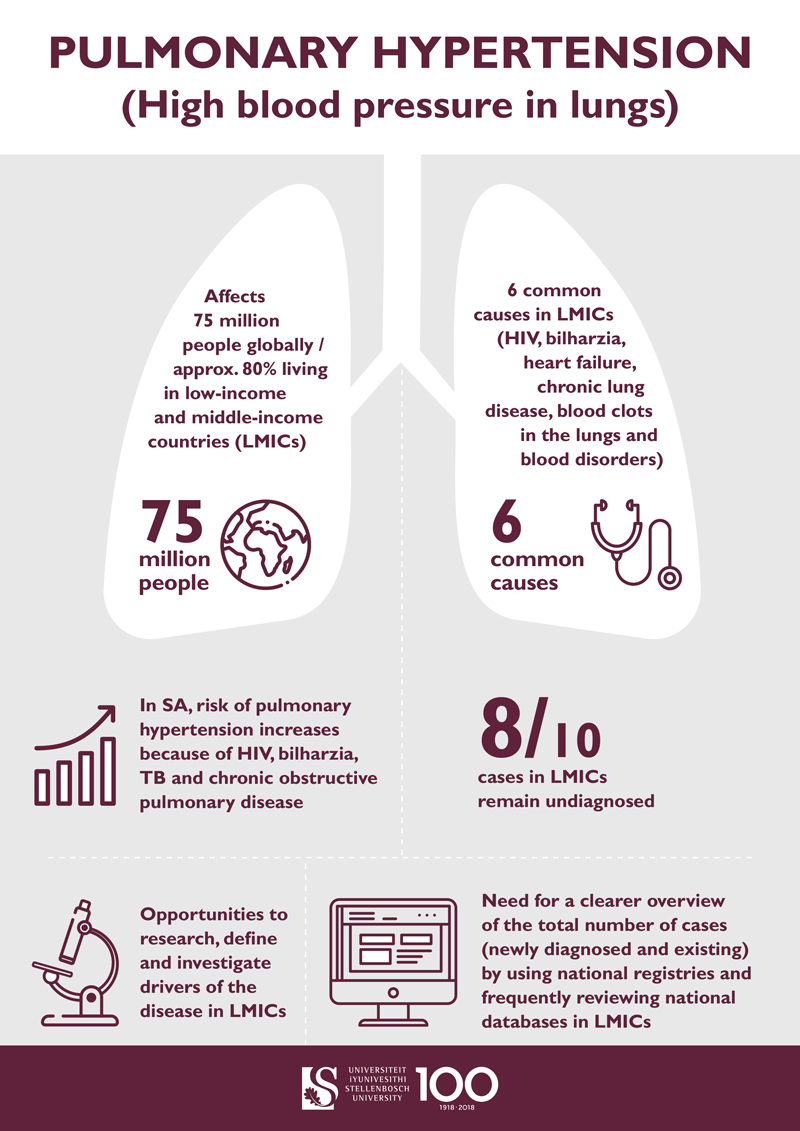Pulmonary hypertension (high blood pressure in the lungs) is a deadly disease that affects about 75 million people worldwide, approximately 80% of whom live in low-income and middle-income countries (LMICs). It is difficult to treat the condition in these countries due to a lack of relevant data and resources.
“It is clear that data surrounding the burden of disease and causes of pulmonary hypertension affecting people in LMICs is inadequate, while the data that does exist have largely been obtained from a small number of locations, and is extrapolated, perhaps erroneously, onto the rest," says Dr Gerald Maarman from the Division of Medical Physiology and the Centre for Cardio-Metabolic Research in Africa at Stellenbosch University. He and colleagues Dr Jane Shaw and Prof Brian Allwood (from the Division of Pulmonology) conducted a review of pulmonary hypertension in LMICs, focusing on the most common causes in these regions, and highlighting some of the contextual challenges faced.
The review was published in Current Opinion in Pulmonary Medicine recently.
According to Maarman and his co-authors, delayed diagnosis of pulmonary hypertension has long been recognised as a significant challenge in LMICs where there are limited resources and also a lack of awareness about the condition.
“Due to a lack of awareness about pulmonary hypertension in primary healthcare and gross under-diagnosis due to a lack of resources, the disease may be more prevalent than is frequently described in the literature.
“Historically, the lack of awareness has been partnered with clinical nihilism, as appropriate therapies have either been unavailable or very expensive. This has driven physician interest away from pulmonary hypertension towards other conditions where outcomes are perceived to be better."
The authors write that in many LMICs, pulmonary hypertension occurs in the context of clinical services that are already dealing with high burdens of other communicable and non-communicable diseases. They point out that some of the common causes of pulmonary hypertension in LMICs are HIV, bilharzia (an acute and chronic disease caused by parasitic flatworms), heart failure, chronic lung disease, blood clots in the lungs and blood disorders.
“In South Africa, the risk of pulmonary hypertension increases because of high levels of HIV, bilharzia, TB and chronic obstructive pulmonary disease (a chronic inflammatory lung disease most often caused by smoking).
Africa, the risk of pulmonary hypertension increases because of high levels of HIV, bilharzia, TB and chronic obstructive pulmonary disease (a chronic inflammatory lung disease most often caused by smoking).
“All these diseases can cause pulmonary hypertension, and given their high prevalence, it is highly likely that more patients will develop pulmonary hypertension," say the authors. They add that there are undoubtedly many undiagnosed patients suffering from pulmonary hypertension around the globe, with eight out of 10 cases said to be in LMICs.
Opportunities
Despite the challenges with regard to diagnosis and treatment of pulmonary hypertension in LMICs, there are also many opportunities.
The authors contend that “effective advocacy could potentially increase awareness for, and clinical interest in, this disease, especially among clinicians and researchers in the primary, secondary and tertiary healthcare sectors. This could precipitate the much-needed shift in thinking towards optimism that has driven established pulmonary hypertension centres around the world.
“There is also much opportunity to research, define and investigate drivers of the disease in LMICs, where its unique causes, uncommon in developed countries, are more easily and cost-effectively studied."
They believe that in areas where access to investigations is limited, pragmatic and potentially non-invasive diagnostic and treatment algorithms could be proposed and tested, which may lower the barriers to entry in receiving treatment for patients.
They also highlight the need for a clearer overview of the total number of pulmonary hypertension cases (newly diagnoses and existing) by using national registries and frequently reviewing national databases in LMICs.
Infographic by Geola Bergman (Corporate Communication and Marketing).
FOR MEDIA ENQUIRIES ONLY
Dr Gerald Maarman
CARMA: Centre for Cardio-Metabolic Research in Africa
Faculty of Medicine and Health Sciences
Stellenbosch University
Email: gmaarman@sun.ac.za
ISSUED BY
Martin Viljoen
Manager: Media
Corporate Communication & Marketing
Stellenbosch University
Email: viljoenm@sun.ac.za

